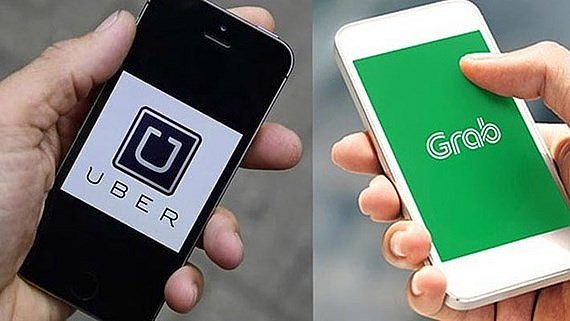Singapore competition watchdog fines Grab, Uber S$13 million in total over merger deal
 |
| A view of Uber and Grab offices in Singapore on Mar 26, 2018. illustration photo |
Uber was fined S$6.58 million while Grab was fined S$6.42 million. The Competition and Consumer Commission of Singapore (CCCS) said the penalties were imposed to “deter completed, irreversible mergers that harm competition”.
In levying the fines, CCCS said it considered the companies' turnovers, the nature, duration and seriousness of the infringement, and aggravating as well as mitigating factors.
US-based Uber sold its Southeast Asian business to bigger regional rival Grab in March in exchange for a 27.5 per cent stake in the Singapore-based firm. The following day, CCCS said it would launch an investigation into whether the transaction infringed anti-monopoly laws.
As part of its investigation findings, the watchdog highlighted that Grab increased its prices after the removal of its closest competitor, Uber.
It found that Grab trip fares, net of rider promotions, have increased by between 10 and 15 per cent after the acquisition deal.
Additionally, CCCS said it has received "numerous complaints" from both riders and drivers on Grab's fares and commissions.
It highlighted changes Grab made to its loyalty programme GrabRewards, such as reducing the number of points earned by riders per dollar spent, as well as a decrease in the number and frequency of driver promotions and incentives.
CCCS also found that Grab currently holds about 80 per cent of the market share, and that the “strong network effect” makes it difficult for potential competitors to scale and expand in the market, particularly given that Grab imposed exclusivity obligations on taxi companies, car rental partners, and some of its drivers.
MEASURES TO ADDRESS COMPETITION CONCERNS
The competition watchdog also announced on Monday measures to lessen the impact of the deal on drivers and riders and open up the market for new players.
It ordered Grab to remove exclusivity arrangements with drivers and taxi fleets, and to maintain its pre-merger pricing algorithm and driver commission rates.
"This protects riders’ interests against excessive price surges, and drivers’ interests against increases in commissions that they pay to Grab," CCCS said.
It also ordered Uber to sell cars under its vehicle leasing business Lion City Rentals to any potential competitor who "makes a reasonable offer based on fair market value", and prohibited Uber from selling those vehicles to Grab without regulatory approval.
Lion City's fleet totalled 14,000 vehicles as of December.
“Mergers that substantially lessen competition are prohibited and CCCS has taken action against the Grab-Uber merger because it removed Grab’s closest rival, to the detriment of Singapore drivers and riders," CCCS chief executive Toh Han Li said.
“Companies can continue to innovate in this market, through means other than anti-competitive mergers.”
The Land Transport Authority said in a statement that it supports the competition watchdog's decision, which it said is in line with an ongoing review of the regulatory framework for the sector.
CCCS DECISION AN "INAPPROPRIATELY NARROW DEFINITION OF MARKET": UBER
Uber said it believed CCCS' decision was based on an "inappropriately narrow definition of the market", and that it incorrectly describes the dynamic nature of the industry, among other concerns. It said it would consider appealing.
Grab said it completed the transaction within its legal rights, and maintained it did not intentionally or negligently breach competition laws.
It added that it had not raised fares since the deal, and said for drivers to have full maximum choice, all transport players, including taxi operators, should also be subjected to non-exclusivity conditions.
It said it would abide by remedies set out by the CCCS.
What the stars mean:
★ Poor ★ ★ Promising ★★★ Good ★★★★ Very good ★★★★★ Exceptional
 Tag:
Tag:
Themes: Ride-hailing services
Related Contents
Latest News
More News
- PM urges Ho Chi Minh City to innovate and remain Vietnam’s economic locomotive (November 26, 2025 | 15:29)
- Experts chart Vietnam's digital finance path: high hopes, high stakes (November 14, 2025 | 10:56)
- Vietnam’s seafood imports surge 30 per cent in first 10 months (November 10, 2025 | 19:35)
- Vietnam’s durian exports hit $1 billion milestone (October 30, 2025 | 17:41)
- Beyond borders: Sunhouse and new era of Vietnamese brands on Amazon (October 28, 2025 | 10:46)
- Record-breaking trade fair set to open in Hanoi (October 15, 2025 | 15:59)
- Timber sector seeks solutions to VAT refunds (October 14, 2025 | 18:58)
- Tether explores investment prospects in Vietnam’s digital asset sector (October 10, 2025 | 18:09)
- Vietnamese investors pour nearly $847 million into overseas markets in nine months (October 08, 2025 | 18:42)
- Vietnam amends Law on Civil Aviation to create drive airport investment (October 03, 2025 | 18:29)























 Mobile Version
Mobile Version